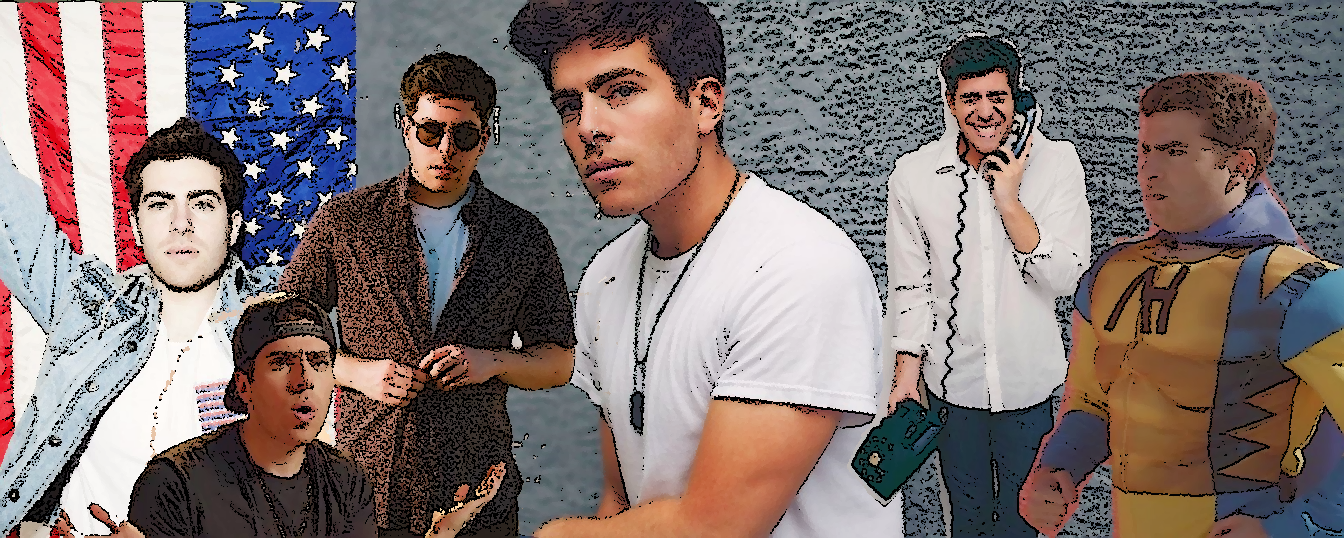
I Listened to Every Hoodie Allen Album So You Don’t Have To, Though You Should
When I became single again a few months ago, I warned my co-editors that there was a non-zero chance I’d get back into “frat rap”, as I had been a bit infamous for a few years prior. Turns out, it happened, and here I am, writing an entire article about it in order to bore myself of it and finally get through this phase. Frat rap occupies this special place in our musical world, somehow sharing more with doo-wop than with the jazzy righteousness of Kendrick Lamar or 2Pac, and also somehow making lyrics like, “I met her at my show, then we smashed right after, If we go three rounds then she’ll fall in love faster,” and “mouth my words, don’t say shit, shh, shut up bitch and ride this dick,” sound almost cool and totally not problematic at all coming out of white-as-hell G-Eazy and Mac Miller… almost. Frat rap is pretty silly, what’s not hilarious about a bunch of white guys rapping over 1950s samples about how many women they’ve slept with, while declaring themselves the “James Dean of Rap” (whatever the hell that means)? But, for all that, it’s got an anthemic quality and irresistibly catchy nature that really hit the spot in the early-to-mid 2010s, which I guess some of us are nostalgic for. If there is a place on the Internet for me, where people still believe The 20/20 Experience and Random Access Memories are cool, are still excited for President Hillary Clinton, are still playing Minecraft to death, and still consider “Gangnam Style” the greatest music video of all time, please, email me right away.
This is not to say that I am your stereotypical frat rap fan. I am vehemently opposed to sandals, I do not drink Budweiser (all praise the King of Beers), nor do I own any pastel-colored clothing. I don’t endorse the misogynistic Georgetown frat boy aesthetic, the lyrics that treat women like objects, the college party scene, or white rappers above those they were influenced by. I do not myself get all the women and I have never thrown up from drinking a Kavanaugh of beers, but being a white boy myself, I embrace the trashiness and comedy that encompasses frat rap at its best. Not necessarily as a serious contribution to the compendium of humankind’s contribution to music, but because it’s catchy and it makes me smile. If that makes me a monster, so be it.
To my credit, I have never actually been to a frat rapper’s concert. I just have a bizarre taste in music where I barely care what the words say as long as I can get down and groove along. To quote something that has probably been said at a Mike Stud concert, “It’s all about the production, man.” And I totally agree, dude. So I’m channelling what I’m sure is a deeply problematic sense of music I sometimes like into a definitive ranking of the discography of my favorite frat rapper… the one, the only, Hoodie Allen.
Hoodie, or, Mr. Allen, whatever you prefer, is a University of Pennsylvania graduate and Google alumni who decided to leave that life behind to pursue his passion in pumping out some feel-good beats about partying at the beach house, not having to go to work, and getting it on the low. Hoodie Allen started to make waves when he appeared on Billboard’s Uncharted charts and peaked at #1 on the Billboard Rap charts in 2016. I’ve always surmised and contested that Hoodie Allen is more talented than he gets credit for. He seems to tackle his fame and obscure place in the musical universe without taking himself too seriously, and he has had some clever lyrics commenting on fame, trying to make it, and the prospect of getting laid all over his house. He’s got strong, unique production work to support his lyrics (and decent flow!) and has paired up with some genuinely talented artists like Chiddy, Chance The Rapper, and — though I accept that I may be in the minority in not considering him “genuinely talented” — Ed Sheeran. Hoodie Allen may raise an eyebrow every time I ever say his name in a crowd amongst my friends, colleagues, and fellow bus passengers, but he is nonetheless a relatively harmless, fun, and exemplary frat rapper worthy of your attention.
So if you’re looking to join me in my appreciation for the stylings of one Steven Adam Markowitz, here’s where you should start. Hoodie Allen has eight “albums”, which I quote because this includes his three mixtapes (Pep Rally, Leap Year, and Crew Cuts); one EP (All American), and four studio albums (People Keep Talking, Happy Camper, The Hype, and Whatever USA). I’m excluding his other EP, Americoustic, because it is a collection of acoustic versions of some of his earlier songs and it’s real weird. I’ve listened to all of these albums and ranked them so that you, dear reader, do not have to — though by the end of this, I hope I’ve convinced you that one of these albums stands out and is genuinely a good album worthy of your ear.
#8 – The Hype (2017)
I can’t believe I’m about to admit this on the Internet, but I have an autographed vinyl copy of this album. It’s not my favorite, but it was pressed on vinyl and came with Hoodie Allen’s signature, so why the hell not! I’ve listened to enough of his music for free (most of his content is free to download) so I felt I should throw him 20 bucks, and here I am, that’s in my credit card statement now. The average track on this is better than its predecessor, Happy Camper, but it still loses out simply because it falls flat for not really bringing anything really new to the table — though he does a serviceable Fall Out Boy impression throughout, be it intentional or not. The Hype’s big difference over Happy Camper is that it probably errs towards singing over rapping, taking on a pop rap sound over a frat rap one. It tries to be trappy, and really has no singular hit, instead kind of starting to blend together with much of his later work. When Allen tries to be serious, solemn, and take himself too seriously is when he does his worst work, and that’s where The Hype goes wrong. That said, you can take my autographed Hoodie Allen merchandise over my cold, dead body.
Best Song: “All for Me” has some serviceable pop culture references and I have a whole conspiracy theory that this samples the part of MIKA and Ariana Grande’s “Popular Song” that in and of itself samples “Popular” from Wicked. It doesn’t really feel that special, but it’s okay. Justin Timberlake’s “Señorita” gets a shout out in this song, so, there’s that.
Worst Song: This is a close one, both “Play the Field” and “Fakin” are pretty bad. The production on “Fakin” is better, and though the vocals are kind of trash on both, Wale is featured on “Fakin,” which chocks it up a notch. I think it really comes down to the fact that the chorus on “Play the Field” is literally just “play the field, play the field, play the field, play the field, play the field, play the field, play the field, play the field…”, so that one is probably worse.
#7 – Pep Rally (2010)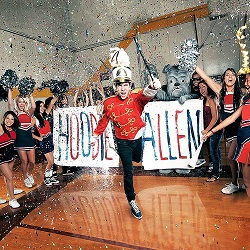
His first mixtape, Pep Rally features some tracks sporting the by-then-long-in-decline “Chipmunk soul” samples (ask Kanye West), and an interesting enough rap over a sample of the Black Keys’ “Tighten Up” in a song of the same name. “You Are Not A Robot” is the most famous song on this album and has a vocal sample mixed to sound not dissimilar to the “Pretty White Girl Sings Dave’s Thoughts” bit from Chappelle’s Show. There’s a franticness to this album, as if there’s a lot to get out in a little bit of a time, and he doesn’t quite have his footing yet but needs to go through this to know he can fully get there. But that makes it novel, and does feel like something genuinely new. The production quality on this mixtape is both impressive given its homegrown nature, but its amateur nature still kind of shows through. It’s not as tight or crisp sounding as his later albums, but has some understated upbeat tracks that are indicative of where his music will go at its finest over the course of the next few years. This album does stick pretty close to the average it sets at the onset, never really totally dropping the ball, but only probably once rising above it. I blame some of that on the lower quality sound overall more than I do the talent or production behind it.
Best Song: “You Are Not A Robot” is the most memorable song on this album for a reason, the flow over the sample and the mixing makes for a genuine groove.
Worst Song: Going to have to give it to “Words of Wisdom” on this one, though “So Much Closer” was… close. “So Much Closer” is pretty tedious, but “Words of Wisdom” is just a really bad song, and the sample on it is very of an era.
#6 – Happy Camper (2016)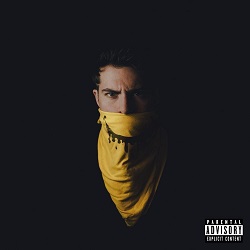
His second studio album, Happy Camper, doesn’t have the unbridled excitement and thrill that makes his hits on All American, Crew Cuts, or People Keep Talking really work; and really only has one really good song. It does try a couple of new things, reaches into some unexplored territory, and that’s why it’s better than The Hype, but it is largely unmemorable even as the sound quality has evolved.
Best Song: Easy choice here, “Surprise Party”. Blackbear’s vocals and Hoodie’s faster crescendo towards the chorus mix and match for a solid banger. Unlike his other top songs, I don’t think there are any particularly clever lyrics in here, or enough to really let them take hold. It’s pretty straightforward about what it is, a song about having a girl over for the having of sex, and that, contrary to the title, “this ain’t no surprise party.”
Worst Song: “Remind Me Of”, it’s kind of poppy in a bad way, and it’s just… repetitious nothing. I also really do not care for “Champagne and Pools”, one of the singles off this album — it insists on itself being fancier or better than I think it at all is. It’s honestly baffling to me how this is was chosen as a single but “Surprise Party” was not.
#5 – Whatever USA (2019)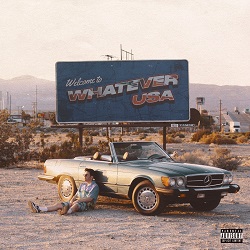
His most recent album, Whatever USA falls prey to the problems of its predecessors Happy Camper and The Hype, preferring to linger on more boring and repetitive vocals (we’re talking using the same line over and over and over on repeat) with production that mostly goes unnoticed, and never really living up to the enthusiasm and passion of some of his earlier albums. I do think Whatever USA does something well in that it manages to not have a truly bad song, but the flip side of that is that it has no tracks that truly stand out, and does not make a meaningful impact on his larger discography. Or maybe by the time I got to this album, my ears were trained to accept all Hoodie Allen songs as a baseline “fine”, who knows.
Best Song: “Giving Up On Us” flies higher than the rest of this album mostly thanks to Spencer Sutherland’s featured vocals and a slightly more emotional performance and staccato beat.
Worst Song: This is hard, like I said, they’re all just pretty “fine” on this album, but I suppose “Hell of a Time” is the most plastic and boring, so I’ll give it to that one.
#4 – Leap Year (2011)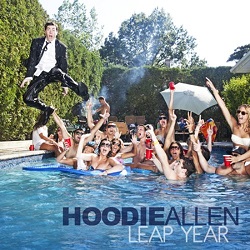
Leap Year starts out more relaxed and comfortable than its predecessor, Pep Rally. It takes its time and has a more casual, pool party vibe (which is exactly what the album cover is telling me!), like he’s having a good time and isn’t stressed about it. The production and sound quality have improved to the point where this really does come through in the music and in his voice. It gets a bit louder and more crowded than it needs to in the middle, and I genuinely thought Hoodie Allen was in fact Kanye West at a few points, they sound really similar for a few verses in “Soul On Fire”, so maybe there’s some lingering influence there. “Push You Away”, a softer song in the middle of the album, is probably the first truly introspective and “sadboi” track he’ll have, previewing what will come in some later albums. It’s kind of mellow and haunting, while still giving you a beat you can sing to in the car, and I dig it. It kind of abruptly jumps to a song that proceeds to rhyme “Ibiza” with “pizza” but hey, can’t win ‘em all. The album starts to pick up as it closes with “#WhiteGirlProblems” which is fun enough, but loses the oomph with an underperforming closer in “Dreams Up” before ending with a Elton John-esque song about how he’s handling a girl asking him to move out via a “Moon Bounce” (the piano in this song is actually kind of good though).
Best Song: “The Chase Is On” is an all around feel good song, the chorus makes me want to do that arm roll-ey move that people do when they dance, it’s very danceable even though it’s not quite the most special song on this album; which is actually a pretty good metaphor for this album in the wider context of his entire collection. “Push You Away” is also pretty damn good, it’s like a Shakira song was slowed down and a sad boy is rapping over it. I think my heart is telling me “Push You Away” but my need to dance is telling me “The Chase Is On”, so since I make the rules here, I’m calling it a tie.
Worst Song: I am tempted to say “Flipping Out”, which doesn’t so much have the aesthetic as a chill pool party as it does a cheap luau that someone got high at and is now playing in slow motion for them. But I think “Dreams Up” is probably the worst song on this album, it’s kind of cheap, repetitive, and optimistic in a way that doesn’t quite land.
#3 – All American (2012)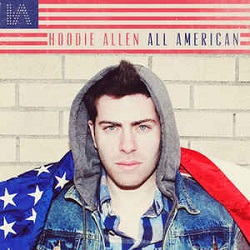
His first non-mixtape release, All American debuted as the number one album on iTunes and skyrocketed him to fame! If you know him from one thing, it’s probably from this album. Despite the fame, he was able to maintain his signature personal and more intimate appeal, regularly interacting with his fans, promising to personally call every fan that bought the album on its first day. This album starts to lean more on Hoodie’s vocals and singing, mostly to its discredit,Some of the better songs from this album are on his previously-mentioned Americoustic, his 2013 acoustic album… if you want to ruin “No Interruption” for yourself, here you go. Though I’ll admit I do like the acoustic guitar riffs in its beginning. but has a saving grace in “No Interruption”, the lead single which absolutely makes the album and elevates it from its dregs. “No Faith in Brooklyn” is the other single on the album, and if you somehow missed the “No Interruption” love, you may have found something to enjoy in the more sentimental and sappy song here. I think I overdosed on that song a few years ago so I find it a bit boring now, but it is a nice nostalgic listen. There are some other just fine songs in here which I feel do not reflect his best work but are at least serviceable and may even have been your favorites if you were an early fan of Hoodie, like “Small Town”, “Ain’t Gotta Work”, and the Disney-bop-like “Eighteen Cool”. Nonetheless, the production and sound quality are clearly stepping up and he’s starting to get slightly more experimental and emotional, while hitting the mark exactly with “No Interruption”.
Best Song: As if it even needs to be said. “No Interruption” is hands down Hoodie Allen’s best song of all time. I could listen to this song for days and never get tired of it. I know every line and beat and it just pumps me the hell up! It reminds me of such great times hanging with good friends, nodding and singing along to this song before heading out for a great night. It never hesitates to get me doing the signature head side-to-side dance that he does in the music video. Endlessly catchy, it’s the epitome of the best of its genre and of Hoodie Allen: something that takes a boyish, immature concept and glorifies it with a sick flow and a well orchestrated beat, turning it into a semi-parody of itself while making everyone in the room admit they actually kind of like it.
Worst Song: “Top of the World,” it’s just a little plain with a relatively uneventful build. It also doesn’t say much other than that he’s “makin’ money right now.”
#2 – Crew Cuts (2013)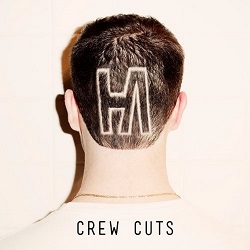
His third mixtape, Crew Cuts may be Hoodie Allen’s most sensitive album, featuring more reflective slower songs like “Let Me Be Me”, “Where Do We Go Now”, and “Good Intentions”. Hoodie’s singing on this works better than it does in All American and this album probably has his first big featured artists, with Chance the Rapper and Chiddy complementing some of the best songs he’s done. It’s also very well produced for a mixtape, and most of the production value is laudable and unique compared to the more audibly consistent Pep Rally and Leap Year. It’s also probably his “chillest” album, in that no song is a true rager, but mostly ideal for a more moderate yet upbeat vibe, with pretty heavy piano instrumentals scattered throughout; even if the lyrics can be over the top, it’s sung with a cadence not dissimilar to what might be expected from a boy band. Even his most lewd song on this album, “Two Lips”, is weirdly more sentimental than you’d expect. Seriously, listen to this song and think about what he’s singing compared to the instrumental, it’s very interesting. But it works! Hoodie Allen’s unexpectedly pleasant voice actually works even when he’s not rapping and counter to what the lyrics in the songs actually are, the album cover, and its larger genre, it comes across incredibly straightforward, understated, and sedated; rarely sounding douchey at all.
Best Song: “Fame Is for Assholes”, this song featuring Chiddy, chugs along at a pace that works really well with the simple notes over which they’re rapping. It’s probably the most exciting song on the album and Chiddy’s stint on here is fun and fast enough to balance out some of the slower songs throughout the album. It’s chock full of clever pop culture double entendres and is probably the song with the most clever lyricism of Hoodie’s works.
Worst Song: “Reunion”, its chorus-like sample and Kanye West-like processional do not land very well. I really don’t care for “Cake Boy” either but I think its rap is more interesting even if its chorus is worse. “Cake Boy” has a simplistic instrumental not unlike Kendrick Lamar’s “Backseat Freestyle” that kind of gives this a feel that it truly is happening in a kitchen with a group of friends banging on pots and pans while Hoodie is spitting rhymes over them, whereas “Reunion” feels too produced.
#1 – People Keep Talking (2014)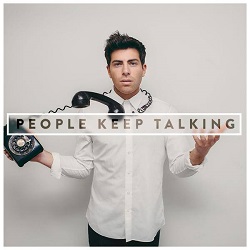
This is his masterpiece, his reaction to fame, how it feels to succeed and get what he wanted, and how to stay true to his art in the face of studio exploitation and those around him who want him to focus on them instead of his vision. Okay, maybe I’m stretching it a little, but not really, it is genuinely about all of these things! It’s in all honesty a really good album. People Keep Talking is his first studio album and it lands with the corniness, passion, flow, and excitement you’d expect from an independent rapper who suddenly got to fulfill his dreams. It received acclaim on its debut, and arrived at number 8 on the Billboard 200, has four singles, some great music videos, and so neatly contains the unbridled fun that Hoodie Allen is at his finest. It’s his longest album, but unlike The Hype, it manages to maintain its speed and cohesiveness throughout, never verging on the tediousness of the albums that would follow it.
It opens with the mellow “100 Percent of Something”, a reflection on his success and how much work it takes to still require some degree of luck to even get close to getting there. Now that he’s there, he doesn’t want to let it go, and can’t help but want more, and closes with a set up for the next song where two fans attempt to call his phone number. This leads into the title track, “People Keep Talking”, where he faces down his so called fans who say he’s changed and has to rationalize them as haters, taking pride in the fact that their girlfriend’s don’t have time for them anymore since they’re too busy listening to his music. His emphasis on being accessible to his fans and not signing to a major label seems to bite him, as he doesn’t charge to meet fans and just tries to put out what people will like, but ultimately finds the best way to keep on doing what he’s doing is to ignore the comments, calls, and criticism. The album manages to coherently stay the throughline on its theme, braggadocious when it needs to be, parodying the record industry with some sketches and scathing lines, and keeping the momentum with underrated hits like “Sirens” and “Won’t Mind” (this song absolutely should be played at every wedding) that are embellished by the shouts, excitement, and pure enthusiasm that deliver in keeping Hoodie authentic to his more humble homegrown roots on top of genuinely great sounding music. Ed Sheeran is featured on the most famous song on this album, “All About It”, and even he gets in on the fun by rapping along. It’s an exuberant ode to being true to what you want and like, reaping the rewards for it, and having a blast doing it. This is not to say there are not melancholy notes; “The Real Thing” ends with a woman calling Hoodie upset that she hasn’t heard from him because he’s been putting his time into the album, a call he immediately deletes. Does fame mean having to leave some part of yourself behind? Or is it a crutch to get away from adult responsibilities that impede on his childish indulgences?
Is People Keep Talking quite the exploration on the affliction of fame that Kanye West’s My Beautiful Dark Twisted Fantasy or Kendrick Lamar’s To Pimp a Butterfly are? Of course not, but the clever rhymes and references intermingled against sketches of fans and producers delivers a satisfying picture of what it feels like to finally achieve what you were looking for: if you can channel out what doesn’t matter, it feels good.
Best Song: “People Keep Talking” is an all around great song, it’s clever, it’s funny, and it’s really what this is all about. It’s the heart of the album and it cleverly weaves between how to be a good celebrity with the annoyances therein. “Sirens” and “Won’t Mind” are also really great.
Worst Song: Really the only bad song on this album is its last track, “Against Me”, which aims for the sentimental to close it off, but comes across a little overdone and whiny.